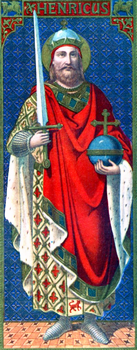Lives of the Saints
Our Models and Protectors
Spiritual Bouquet:
July 15

Saint Henry
King of Germany and
Emperor of the Holy Roman Empire
(972-1024)
Henry the Pious or the Lame, Duke of Bavaria, was born in 972, and bore his father's name. Saint Wolfgang, bishop of Ratisbonne, baptized him and afterward raised him in the practices of virtue fitting for a great sovereign. His father died when his son was 23 years old, and Saint Henry assumed the paternal title of Duke of Bavaria. It was at this time that he married Cunegundes, the holy spouse whom God gave him, and who like himself is today a canonized Saint. They observed perfect chastity all their lives, and rivaled one another in their zeal and love for their subjects.
One night Saint Henry had a dream and saw his very dear deceased master, Saint Wolfgang, who told him to read the words written on a wall: After six. He supposed this meant he would die in six months, and then, after that did not occur, in six years, and he prepared himself for that eventuality by giving generous alms and initiating other good works. At the end of the sixth year, he found the prediction verified in an unexpected way, by his election as emperor and king of Germany on the first day of the year 1002. It was an archbishop who consecrated him emperor on July 8th of that same year. Trained in the fear of God, he ascended the throne with only one thought — that of reigning for God's greater glory. By his happy combination of Christian, royal and military virtues, he proved that a good king is a true gift of heaven. He prayed often, meditated the law of God constantly, and to be armed against pride practiced humility in all circumstances, and never let himself be fascinated by human glory.
The pagan Slavs were then despoiling the empire. He provided for the reparation of the episcopal churches of six dioceses, which had been almost entirely destroyed by the invaders. Menaced by an army of one of these, he prayed to the patron of the ruined church of Merseburg, saying, Great Saint Lawrence, illustrious martyr of Jesus Christ, if by your assistance I can submit these barbaric nations to the Christian religion, I will with the help of God re-establish in its original dignity, this church consecrated to your honor. He prayed again before the battle, invoking three martyrs, and then attacked the invaders with a small force; but an Angel and the three holy martyrs were seen leading his troops, and the heathen simply fled in despair. Poland and Bohemia, Moravia and Burgundy, were in turn annexed to his kingdom, and Pannonia and Hungary won for the Church.
When the Faith was secure in Germany, Henry passed into Italy, drove out an antipope and brought Benedict VIII back to Rome. He was crowned in Saint Peter's Basilica by that Pontiff, in 1014. It was Henry's custom, on arriving in any town, to spend his first night in prayer, in some church dedicated to our Blessed Lady. As he was praying in Saint Mary Major's, during the first night of his arrival in Rome, he saw the Sovereign and Eternal Priest-Child Jesus enter to say Mass. Saints Lawrence and Vincent assisted, as deacon and sub-deacon. Countless Saints filled the church, and Angels sang in the choir. After the Gospel, an Angel was sent by Our Lady to give Henry the sacred book to kiss. Touching him lightly on the thigh, he said, Accept this sign of God's love for your chastity and your justice, and from that time on, the emperor always limped.
Saint Henry employed the fruits of his conquests in the service of the temple, imitating in this the royal prophet-king. The forests and mines of the empire, all the best resources which his treasury could provide, were consecrated to the sanctuary. Stately cathedrals, noble monasteries, innumerable churches enlightened and sanctified the once heathen lands. In 1024 Henry lay on his deathbed; he then gave back to her parents his wife, Saint Cunegundes, a virgin still, as a virgin he had received her from Christ, and at the age of 52 years surrendered his own pure soul to God.
Les Petits Bollandistes: Vies des Saints, by Msgr. Paul Guérin (Bloud et Barral: Paris, 1882), Vol. 8; Little Pictorial Lives of the Saints, a compilation based on Butler's Lives of the Saints, and other sources by John Gilmary Shea (Benziger Brothers: New York, 1894).